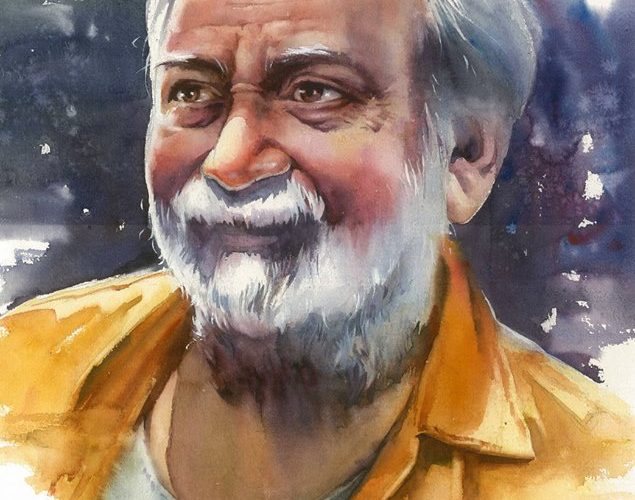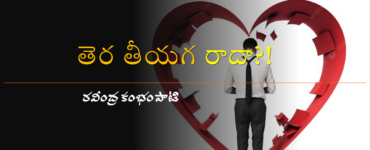Daivamichchina Bharya, Gudipati Venkata Chalam: Aruna Publishing House, Eluru Road, Vijayawada, First printed in 1983 (Reprints 1987, 1992), Pages 116, Price Rs 10-00.
Gudipati Venkata Chalam, popularly known as Chalam is a prominent writer in Telugu literature for multiple reasons. While he was alive, he was considered a highly controversial writer by his contemporaries. Today he is considered from a totally different perspective, distinctly different from the writers of his time. He was then and now a champion of women’s rights and sensibilities. When we say rights, he was not an aggressive activist fighting for the rights of women in the sense of the feminist writers of today. He was mainly concerned with the sensibilities—physical, philosophical and psychological aspects of women’s lives.
Born on 18th May, 1894 to Venkata Subbamma and Kommuri Sambasiva Rao, he was adopted by his maternal grandfather and he became Gudipati Venkata Chalam with a changed surname. In his musings, an autobiography, Chalam talks about his childhood and education. He went to Pittapuram Maharaja’s College, Kakinada and to Madras for higher studies. He was married to a 13-year-old girl, Ranganayakamma, while in Madras. He created commotion by admitting his wife in school and invited the wrath of conservative society by dropping her to school every day on his cycle. He became an enemy of his family and his wife’s family too by relinquishing his sacred thread. Later, he joined as a tutor in Kakinada and afterwards worked at a teacher training institute in Rajahmundry. He went on to become a school inspector under government service.
Chalam, as a young child, familiarised himself with the Hindu religion and religious practices. But when he got rid of his yagnopavitam, he turned against the Brahminical traditions while he was in college. Thus, from the very beginning of his adult life his actions were unconventional and controversial, which made him unpopular. Later when he started writing, his focus was on women’s issues. In his early life he saw the two women he was close to suffering- his mother who suffered the abuses heaped upon her by his father and his sister, who was forcefully married off against her will. On the positive side, he was influenced by social reformers like Raghupati Venkataratnam Naidu and his involvement in the Brahmo Samaj movement. The articulation of his ideas tilted towards the unconventional but his intentions and sincerity were never questioned by the literary critics then and now too. In 1930s he moved to Ramana Ashram in Arunachala hill in Tamil Nadu as he came under the influence of Sri Ramana Maharshi. Though he stopped writing he did not change his views on women, caste and creed even after becoming a believer. He died on 4th May 1979 in the ashram.
He wrote a number of novels which raised a storm in the households and his writings were not brought into the houses where there were young girls. While Maidanam, Sasirekha, Dyvamicchina Bharya, Jeevitadarsam, Brahmanikam, Vivaham were some of his novels, Savitri, Sita Agnipravesam, Pururava were his plays. He also wrote his autobiography with the title Chalam (1972) and another book, called Musings, talks of his experiences as a government servant. Many of his unpublished books and some out of print books were published by Chalam Foundation after his death.
Daivamichchina Bharya (A Wife Given by God) is only one example of a series of novels that Chalam wrote severely criticising the attitude of society and its indifference to women’s suffering in a very strong but strange manner. Radha, the narrator, like his creator and many other male characters of Chalam in his novels, tells us the story of his association with a girl right from his childhood. He used to live in a village where his father was a tahsildar and most of the time, when he was not in school, he used to spend roaming around in the plantations and gardens of people, plucking fruit and eating them along with a group of his friends.
On one fine morning the Rani (Queen) arrived in the village with a lot of luggage, her servants and her three children. He was attracted towards the children, two boys and one girl. He met the family when they all came home to visit them after he was back from school. His father was at home, his mother was dressed as if for an occasion and they introduced the kids to each other and told them to play together. Soon he became friends with the girl and for the next few years, till he goes to high school, he spends most of his time with her, fantasizing kidnappings and rescue games. Even in those games Padmavathi never allowed herself to marry him, even after being kidnapped and rescued by Radha. They played under the trees, on the banks of the pond and in the garden. It was marriage time for Padmavathi and it was arranged with a thirty-year old man. Radha overheard her mother saying her son would have been a better match for the beautiful Padmavathi rather than the fellow they chose. Her father dismissed the talk as they were from a very rich family. The bridegroom was her maternal uncle who studied law and was planning to go abroad for higher studies. They left for Chennapatna after the marriage. Padmavathi was not aware of the implications of marriage and that she had to live with her mother till her husband completed his law course. She was very complacent and casual about the union and the forthcoming separation from her friend. He went for higher school and when met her next in their village, Padmavathi was grown up. But their childhood friendship resumed from where they left it. Throughout the novel, Radha tried to understand her feelings towards him and was keen to somehow make her accept that she was in love with him. She used to admit freely that she was in love with him. She recognised that whatever he aimed to achieve in life it is for her and to make her happy. But at the same time, she never expressed any displeasure with her relationship with her husband. She took it in her stride and accepted it as if it is the most natural thing that she was married to him. At the same time, she proclaimed her love to Radha repeatedly and formed a physically close relationship with him but insisted that their love should not demand sacrifices and hardships from each other in order to sustain. They used to meet each other in the gardens during the dead of the night and talk about the love and indulge in sweet nothings and intimate gestures. She continued to tell him marriage is no impediment to true love and he kept telling her that no man in the marriage bond with a woman would accept his wife’s love or fondness for another. When he realises that she was prepared to live with her husband he resisted the idea and tried to tell her she was not right in doing so. She did not react and he got disheartened. Radha fully understood the meaning of marriage, society’s expectations from a woman and that marriage was not just between two people. but two families and two individuals of the same caste. Society would not tolerate any kind of violation of the norms. Still he rebelled against these norms and expected her to reject her husband and come away with him. He was annoyed with her and refused to interact with her, wrote letters expressing his anger against her- all with an assumption that he had a right over her because she asserted that she loved him. As this started becoming a scandal his father called him home. He marries a girl of his father’s choice, Shakuntala and decides to go to England upon a job offer. This makes Padmavathi pine for him. After nearly five years he re-enters her life. Again, their dilemma continued. He constantly advocates that she should leave her husband. But because he is also now married it becomes an unfair proposition—not only from society’s point of view but also because he cannot ditch a wife he married with full consent.
Padmavathi’s husband, on the other hand, in the initial years took this bond as true friendship and never objected to their relationship but it collapsed as soon as he suspected that Radha was more deeply involved with her and he started imposing restrictions on his wife. She was taken away from him to Singapore. After a lot of persuasion, Radha convinces himself and settles with Shakuntala. He has two children by her. Padmavathi also gives birth to two children. When everything seems to have settled, she writes to him, saying though she was happy that he found happiness in his life, the thought that she has lost him continues to torture her. She goes on to meet him at a hotel in Calicut where he goes to attend a seminar. They spend three days together. Padmavathi’s husband, who is now a judge, comes to know about it and threatens to leave her permanently. He gathers all evidences against them. Radha tells his wife about it and she gets upset too. Naturally, she blames Padmavathi for writing the letter. Padmavathi makes one final visit and tells him that she has decided to save him from dishonour and that he could live happily with his wife and children. But he did not believe her and kept asking her what would she do. She dies in his arms, reassuring him that everything would be fine. The judge enters angrily and finding her body becomes sad and tells Radha between the two of them they had killed her.
The story ends on a sad note. But it raises some questions. Chalam did not have any respect for marriage, though he believed that all parents must take good care of their children. Padmavathi, in this story was innocent in the earlier part of the novel but becomes more mature than Radha in the later part. She realises that their relationship could only end in tragedy. She suggests that they should continue to their love and friendship but not make any sacrifices for it. His parents would not have objected. Her parents would have been convinced but they did not plan on any long-term relationship when they started their friendship. But as per the societal norm she was married and she did not resist the marriage. Similarly, he went after her and resented her marriage, encouraged her to desert her husband but was not seriously planning to marry her. If he plans to take her away there was no place to go. She tried to tell him about the impracticality and suggests they should continue like this and not bother about anything else. So even he married another girl, an innocent girl like his lady love and never really loved her as deeply as he loved Padmavathi. For him, his wife given by the god, in whom he never actually believed, was only Padmavathi.
Chalam wrote with genuine sensibility about the need for freedom for women to choose their partner. He focussed only on the freedom to love and live like free birds. They never seem to think of old age as in many of his novels the story ends before characters become old. When physical wanes what sustains the love was not depicted in the novels. His focus was never on economic freedom but only sexual freedom.
*









I suppose this article on Chalam is absolutely otiose to the Telugu readers (who are familiar with Chalam writings) and provides no profound outlook of Chalam to the non- Telugus. ‘The Passionate Friends’ of H. G. Wells was loosely adapted as దైవమిచ్చిన భార్య by Chalam; Kallury Syamala gaaru should at least have made a reference to the original.
These articles are, as mentioned in the first article of the series , in the nature of introduction to the non Telugu -speaking telugu readers about the fiction of last century.
As you say it could be an adaptation. I personally feel one cannot make any such statements unless one can effectiively establish it’s veracity. I have no way establishing since Chalam did not acknowledge anywhere in the book that it is an adaptation. One may be reminded of it but it does not augur very wel unless we can prove it. I have not read HG Wells ‘original’ if it is so. However by pointing this out you have done some value addition and I am sure avid readers would surely appreciate this. Thank you Mr. Nunna for your response.
Chalam and His Quest.. till today, many of chalam’s works needed to reach International audience. So good to see a synopsis of Chalam’s Novel “ Daivamichchina Bharya” with its implications. Its indeed interesting to see his despair over institution of marriage and also woman who are cornered on these issues. The issue are same between genders but society perception on woman and discrimination is something made chalam write.